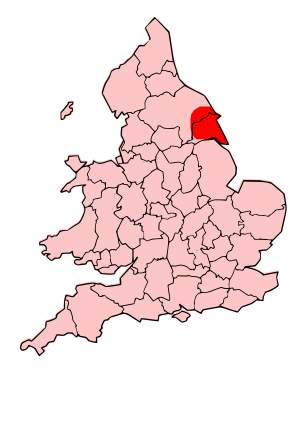Parisi (tribe) facts for kids
The Parisi were an ancient Celtic group of people. They lived in what is now the East Riding of Yorkshire in England. We know about them mostly from an old book called Geographica. It was written around 150 AD by a man named Ptolemy. Some people think the Parisi were linked to the Arras culture. This was an ancient way of life seen in archaeological finds. They might also be connected to another group called the Parisii from Gaul (modern-day France).
Where Did the Parisi Live?
We learn about the Parisi from Ptolemy's book, Geographica. He wrote that they lived near a place called Opportunum Sinus, which means "Good Harbour". Ptolemy probably never visited Roman Britain himself. He likely put his book together using other old maps and writings.
Historians believe the Parisi lived surrounded by another tribe called the Brigantes. To their south, across the Humber River, were the Coritani tribe. Ptolemy also mentioned a town called Petvaria. This town is thought to be near modern-day Brough, East Riding of Yorkshire. He also spoke of a headland called Promontarium Ocellum. This might be Spurn Head or Flamborough Head.
It has been tricky to fully understand Ptolemy's old writings. Different ideas about Opportunum Sinus and Petuaria have come up over time. One idea suggests both the Parisi and Petuaria were right on Opportunum Sinus. This would mean the "Good Harbour" might have been an inlet near Brough. Brough also had a harbour in Roman times, which supports this idea.
The Parisi are also mentioned in a book called De Situ Britanniae. This book was thought to be written by Richard of Cirencester in the 14th century. However, it was later found to be a fake! This book claimed the Parisi had towns like Petuaria and Portus Felix.
Were the Parisi Connected to Other Tribes?
Archaeologists have found special burial sites in East Yorkshire. These date back to the time before the Romans arrived. They are part of what is called the Arras Culture. These burials are different from those in nearby areas. Often, they don't have many items buried with the person. However, some have chariot burials or swords.
These chariot burials are similar to those found in Europe. They are linked to the La Tène culture. This culture was found in parts of western and central Europe. This similarity suggests a possible connection between the Parisi and the Parisii from Gaul. They even have similar names!
What Does the Name "Parisi" Mean?
The exact meaning of the name "Parisi" is not fully known. Some experts, like John T. Koch and Raimund Karl, think it comes from a Celtic language. They suggest it means "the commanders". This is similar to the Welsh word peri, which means "to cause" or "to command".
Another language expert, Eric Hamp, also connects the name to this word. He thinks it might mean "fighters". Xavier Delamarre has a different idea. He believes "Parisi" might mean "they of the cauldrons". This would suggest they were named after a special type of pot used by Celtic people in the Iron Age.


